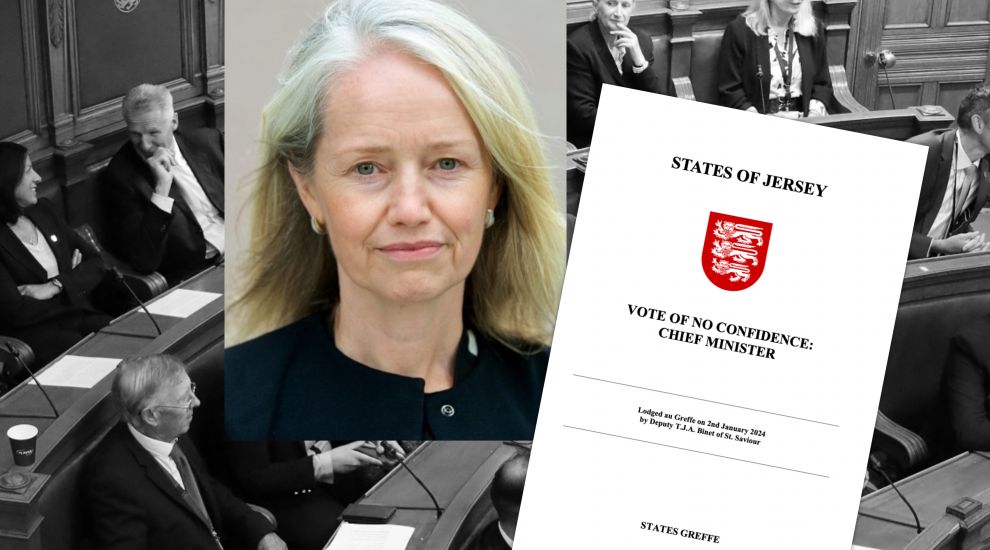


How does a vote of no confidence work? How likely is Kristina Moore to be toppled? And, should Moore fall, will Tom Binet automatically become Chief Minister... or could someone else step up?
Deputy Binet last night resigned as Infrastructure Minister and officially lodged a vote of no confidence in the Chief Minister – accusing her of a "complete lack of integrity" and "woeful lack of leadership skill".
In an explosive report outlining why he was making an official bid to topple Kristina Moore, Deputy Binet described the past 18 months serving in her Government as a “depressing affair for many close to the centre of power” which had seen many “heady promises... [fail] to materialise”.
Express took a look at how a vote of no confidence works, what happens if it is successful, and who might step up as Jersey's new Chief Minister if the opportunity arose...
A vote of no confidence in the Chief Minister can be lodged by any other States Member during the standard four-year political term.
States Members then must debate and vote on the vote of no confidence in the following two weeks (the standard lodging period), although it is possible for the Assembly to agree for the debate to take place earlier.
As Deputy Binet lodged his proposition for a vote of no confidence yesterday, the two week lodging period takes us to 16 January when the vote will take place.

Pictured: Tom Binet resigned as Infrastructure Minister and lodged a vote of no confidence yesterday.
As part of the debate, the Chief Minister will have the opportunity to answer questions and make a statement about her position.
If the majority of States Members vote against the vote of no confidence, Kristina Moore will remain in post.
If the the majority of States Members vote in favour of the vote of no confidence, it triggers the start of the process whereby the Chief Minister and her Council of Ministers ‘fall’ from power.
However, they remain in position until a new Chief Minister and Council of Ministers have been appointed.
Following a successful vote of no confidence in the Chief Minister, any States Member with a minimum of six other Members supporting them can express their intention to be considered for the role of Chief Minister.
This opportunity remains open for a minimum of five clear working days.

Pictured: If the the majority of States Members vote in favour of the vote of no confidence, it triggers the start of the process whereby the Chief Minister and her Council of Ministers ‘fall’ from power.
At the next meeting of the States Assembly, the prospective candidates are given the opportunity to present their strategic vision and answer questions from fellow Members.
The next Chief Minister is then decided on by a vote by States Members. To be successful, a candidate must receive at least half the votes cast.
If only one States Member come forward as a candidate for Chief Minister then they would be appointed without a vote.
The successful candidate then becomes 'Chief Minister Designate'
The States Assembly then meets again within two clear working days to appoint Ministers, at which point, the current Ministers and Assistant Ministers would ‘fall’ immediately and the new Council of Ministers would come into being.
Not necessarily, although he has thrown his hat in the ring....
"I want to give States Members the opportunity to debate the quality of leadership and if they are happy with it they can get on with things without anyone being a thorn in their side. If they are not, then they will have the opportunity to change things," he told the JEP, adding that he would be "duty-bound" to go for the top job.
Deputy Binet doesn't seem to have the backing of the island's business leaders though, as Chamber of Commerce Christmas lunch attendees were recently given the chance to vote for their favourite Kristina Moore replacement.
Former Chief Minister Ian Gorst came out top with 30% of the votes, and Deputy Chief Minister Kirsten Morel was a close second with 23%.

Pictured: A returning former Chief Minister Ian Gorst was the favourite among business leaders.
Infrastructure Minister Tom Binet got 13% of the votes, whilst Reform Jersey leader Sam Mezéc won 12% – beating Social Security Minister Elaine Millar, Education Minister Inna Gardiner, Home Affairs Minister Helen Miles, and former Assistant Chief Minister Andy Jehan.
Former Bailiff and External Relations Minister Sir Philip Bailhache expressed his desire to become Chief Minister following the 2022 election, but ultimately failed to get enough nominations to stand.
The only other declared candidate who stood against Kristina Moore in 2022 was Reform Party leader Deputy Sam Mézec. However, he lost by 39 votes to 10.
Despite Deputy Mézec's previous bid for the Chief Minister role, his party Reform Jersey – which consists of 10 current States Members – said this morning that they haven't met yet to discuss whether to back the vote of no confidence.
This afternoon, Reform Jersey shared a letter to the Chief Minister on their social media which requests an "urgent meeting to discuss our concerns and seek assurances on how she will work with us to change the direction of travel of the Government".
Before the debate on the vote of no confidence against Kristina Moore takes place, Reform Jersey will extend a genuine offer of meeting to discuss how things can be salvaged.
— Deputy Sam Mézec (@SamMezecJsy) January 3, 2024
But let us be absolutely clear - the status quo is unacceptable and cannot carry on. We will not let it. https://t.co/1HknHwU5u6
Sharing the letter, Deputy Mézec said that "the status quo is unacceptable and cannot carry on".
At the moment, it's hard to say...
Unsuccessful votes of no confidence brought against previous Chief Ministers Ian Gorst and John Le Fondré – the latter of which was brought by Kristina Moore herself – show how difficult the bar is to clear.
This morning, Deputy Binet said that he wasn't going to be actively canvassing but would be leaving States Members to make up their own minds.
His proposition was backed by sister Deputy Rose Binet as well as Deputies Mary Le Hegarat and Andy Howell.
It has also been confirmed that Deputy Rose Binet has resigned as Assistant Health Minister and has been immediately replaced by Constable Marcus Troy.
However, not many of Kristina Moore's current Ministers or Assistant Ministers rushed to support her last night when the vote of no confidence was announced.
Only Housing Minister David Warr publicly posted his support, describing the job of Chief Minister as "incredibly tough" and Kristina Moore as "committed".
The job of CM is incredibly tough and @Moore4Jersey is as committed as anyone to doing the best for our Island. We have an incredibly talented set of ministers. I believe in the team and I’ll be backing the CM.
— David Warr (@WarrOnWords) January 2, 2024
Assistant Health and Social Security Malcolm Ferey, meanwhile, posted a completely unrelated article and remained silent about the vote of no confidence.
— Malcolm Ferey - Deputy of St Saviour (@MalcolmFerey) January 2, 2024
Nonetheless, Kristina Moore's statement posted this morning appeared to suggest the Council of Ministers was united, stating: "The New Year is always a good time to start afresh and whilst the Council of Ministers is disappointed to receive the resignation of Deputy Tom Binet, we look forward to rebuilding the team after the vote of no confidence."
Deputy Max Andrews – a frequent challenger of the current Government – confirmed on social media last night that he would not be supporting the vote of no confidence.
When asked why, Deputy Andrews said that he "cannot see an alternative Government being a better one".
"Just because I disagree with the current Government spend, it does not mean to say I have no confidence in the Chief Minister," he explained.
Former Deputy Chief Minister, Deputy Lyndon Farnham shared a post about the vote of no confidence, but didn't express a view either way despite prodding replies.
A vote of No Confinence has today been lodged in the Chief Minister by Deputy Tom Binet https://t.co/d7C8obXPsR pic.twitter.com/8Od6ib09Mq
— Dep. Lyndon Farnham (@lyndonfarnham) January 2, 2024
Constable Andy Jehan – who recently resigned as Assistant Chief Minister citing "severe concerns" about the “indefensible misuse of taxpayers money” within Health – stayed silent on social media and said that he would not be commenting on the vote of no confidence.
Guernsey's Chief Minister and the island's leading committee were all ejected from their roles after a vote of no confidence in December.

Pictured: Guernsey's former Chief Minister Peter Ferbrache – who lost a vote of no confidence against him last month – with Kristina Moore.
It meant the end of office for Deputy Peter Ferbrache who held the island’s top political job since the start of the term in 2020, leading the Policy and Resources Committee (P&R).
External Relations lead Deputy Jonathan Le Tocq and Deputy Bob Murray were also removed from office after Guernsey's States Members backed a motion of no confidence in the committee by 23 votes to 16.
You can listen to Deputy Ferbrache's exit interview, in which he reflects on his tumultuous time in power, here, below or wherever you get your podcasts.
Comments
Comments on this story express the views of the commentator only, not Bailiwick Publishing. We are unable to guarantee the accuracy of any of those comments.